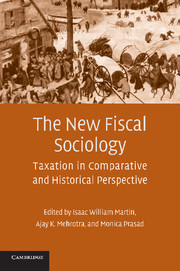Book contents
- Frontmatter
- Contents
- List of Contributors
- Acknowledgments
- Foreword
- 1 The Thunder of History: The Origins and Development of the New Fiscal Sociology
- PART ONE SOCIAL SOURCES OF TAXATION: AMERICAN TAX POLICY IN COMPARATIVE PERSPECTIVE
- PART TWO TAXPAYER CONSENT
- 6 The Politics of Demanding Sacrifice: Applying Insights from Fiscal Sociology to the Study of AIDS Policy and State Capacity
- 7 The End of the Strong State?: On the Evolution of Japanese Tax Policy
- 8 War and Taxation: When Does Patriotism Overcome the Free-Rider Impulse?
- 9 Liberty, Democracy, and Capacity: Lessons from the Early American Tax Regimes
- PART THREE THE SOCIAL CONSEQUENCES OF TAXATION
- References
- Index
8 - War and Taxation: When Does Patriotism Overcome the Free-Rider Impulse?
Published online by Cambridge University Press: 13 January 2010
- Frontmatter
- Contents
- List of Contributors
- Acknowledgments
- Foreword
- 1 The Thunder of History: The Origins and Development of the New Fiscal Sociology
- PART ONE SOCIAL SOURCES OF TAXATION: AMERICAN TAX POLICY IN COMPARATIVE PERSPECTIVE
- PART TWO TAXPAYER CONSENT
- 6 The Politics of Demanding Sacrifice: Applying Insights from Fiscal Sociology to the Study of AIDS Policy and State Capacity
- 7 The End of the Strong State?: On the Evolution of Japanese Tax Policy
- 8 War and Taxation: When Does Patriotism Overcome the Free-Rider Impulse?
- 9 Liberty, Democracy, and Capacity: Lessons from the Early American Tax Regimes
- PART THREE THE SOCIAL CONSEQUENCES OF TAXATION
- References
- Index
Summary
The history of the state is closely entwined with war. For example, Mann (1980: 197) estimates that between 1130 and 1815, the English state spent somewhere between 75 and 90 percent of its financial resources on the acquisition and use of military force. Today, although the nonmilitary responsibilities of governments have vastly expanded, war making and national defense remain a central responsibility of most governments. That military activities use resources is well known. What has been less studied is the extent to which popular wars may build social identity and thereby reduce the cost of government mobilization of resources and the extent to which unpopular wars may do the opposite.
This chapter explores the relationship between citizens' willingness to comply voluntarily with tax obligations and the perceived military threat to a country, as well as the relationship between citizens' willingness to comply and their attitudes toward ongoing military action. To the extent that military threats lead individuals to identify with their government, society, and country, the tax authority can reduce enforcement efforts because the citizens' willingness to voluntarily comply acts as a substitute for the threat of detection and penalties. Taxpayer consent to taxation at a particular moment would therefore be due, in part, to the accumulation of conflicts and their nature over time. As Eisaku Ide and Sven Steinmo argue in Chapter 7, taxpayer consent hinges in part on those aspects of a nation's history that determine the collective willingness to sacrifice.
- Type
- Chapter
- Information
- The New Fiscal SociologyTaxation in Comparative and Historical Perspective, pp. 138 - 154Publisher: Cambridge University PressPrint publication year: 2009
- 19
- Cited by



